A Review of FRHED
( Review is Copyright©2004
by Daniel B. Sedory )

http://www.kibria.de/frhed.html |
|
This is probably
the best Free Hex Editor to begin Hexadecimal editing
with!
( It has many advanced features too! )
Source Code ( VC++ )
is even included with it! |
|
NOTE: I'd recommed that anyone
already familiar with a Hex editor should download an improved version
of FRHED; modified by "PABS." Beginners may still wish
to use the original version which has a "less congested"
menu system.
The modified versions include the ability to IMPORT Hex code directly
from ASCII text files plus MANY other features (such as an interactive
status bar!!). PABS has made some excellent modifications
to FRHED; thank you PABS!
|
FRHED by Raihan Kibria. (
Latest file: 1.1 beta 2003 ?)
There are now a few different versions of Frhed!
Get all of them from Raihan Kibria's Web site!
|
CAUTION:
Frhed may overwrite files without any kind of warning
message! This applies only
to the "Save" function.
Although
I still highly recommend using Frhed, beginners should
open copies of files in a separate work
directory only; never practice your hex editing on original
files!
Note: When using the "Save
As" function in the latest version (1.0.155),
you'll be warned/asked if you want to overwrite a file by the same name.
|
Don't let Frhed's
plain looking window fool you. This sleek little puppy is ready to race through
your code making any changes you wish or comparing its bytes to those of another
file!
[ "Edit" --> "Compare from current offset...
Ctrl+M" ]

The
first time you execute Frhed, a message box will pop up stating: "Frhed
is being started for the first time and will be attempting to write to the registry."
Frhed stores your program preferences in the Registry under this key:
[HKEY_CURRENT_USER\Software\frhed\]
You
can see this message selected below ( highlighted in YELLOW
) - Frhed can open its own binary code and show it to you (version 1.0.155 is
161,792 bytes):
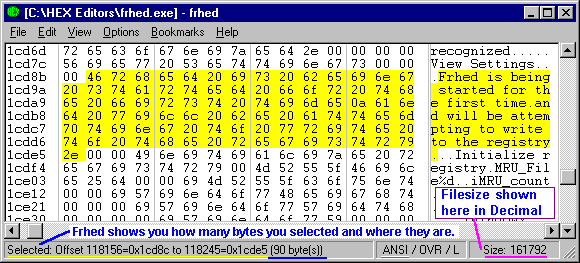
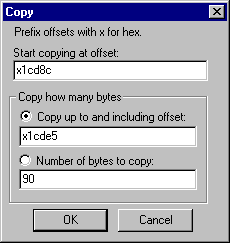 |
|
After selecting some portion of
the code, if you press the CTRL and C keys at the same time, or select
"Copy" from the "Edit" menu, this pop-up
window appears with facts about what you're copying. Or, you can
change the data in the boxes here without having to re-select code on
the screen again! (Other functions, such as "Cut ,"
have similar dialog windows! ) |
I really like the
fact you can view files/programs with either a Windows (ANSI) or DOS (OEM) font
(by selecting "Character set... Ctrl+R" under the "Options"
menu).
If you open a
file comprised of only the hex digits zero to FF in Notepad, it looks like this
(when Edit --> Word Wrap is turned on):
But opening this
same file in Frhed, will show it you in either of these two ways:
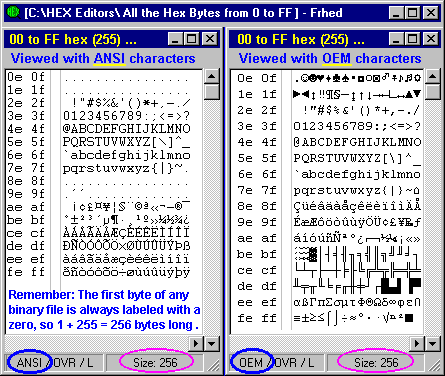 |
|
Pressing the CTRL and "R"
keys together pops up a msg. box.
Select OEM character set (and a font size of 10) to view the bytes as
they might appear in DOS; this file shows all of the 256 possible characters. |
After selecting
and then copying bytes 00 through 4f of the file, "All the Hex Bytes from
00 to FF" to the clipboard, they will appear as follows in the "Paste
with dialogue..." (from the "Edit" menu):
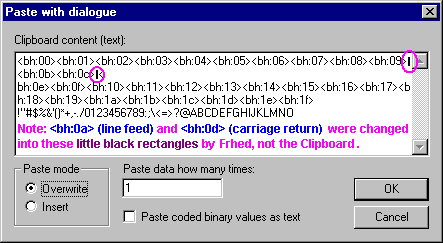
You can also search
for bytes within a program using the syntax tags seen above: "<bh:0d>,"
for example, means a single byte in hexadecimal
with the value of "0d" (13) which could also be represented by: "<bd:13>"
using its decimal value instead.
The syntax for using these tags is:
<{Size}{Numeral
system}:{Value}>
Another example:
You could paste a long word (32-bits) of 2130706433 in decimal
with the tag "<ld:2130706433>" and it would be displayed
as "01 00 00 7f" on the hex-side of Frhed. For a complete explanation
of these tags, see the section "Using the special syntax" in Frhed's
Help File.
(This is definitely an advanced feature.)
Another
nice little feature: files which no longer exist are removed from the history
list (MRU) when you try to open them from the "File" menu.
I really wish that all programs would clean themselves this way!
Other Features of Frhed
(not fully described above) are:
- Native 32 bit Windows
application: long filenames supported, editable file size limited only by
available system memory.
- Small program size
(158Kb); loads very fast.
- Cut, Copy & Paste
binary values.
- Directly enter hex
values or text in main window (overwrite or insert).
- Search for any combination
of text and binary values.
- Bit manipulation.
- Export as hexdump
to file or clipboard.
- Automatically adjust
bytes displayed per hexdump line to window width, or set bytes per line manually.
- Intel or Motorola
binary format. [ This Shows up on the display as an L or B: L = Intel ("Little-Endian")
and
B = Motorola ("Big Endian").]
- Can be used as a
"Send to" Target.
- Set bookmarks
to easily access offsets in the file.
- Load files partially
(great for working on huge programs!).
- Load files by dragging
them into the window.
- Apply binary templates
for structured information.
- Source code is included.
(Written with Microsoft Visual C++ 4.0. Does not use MFC, only Win32 API calls
and C library calls, uses C++ classes).
Click anywhere on this pic
to go to FRHED's homepage:
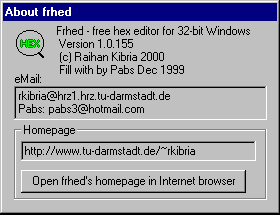
http://www.kibria.de/frhed.html
Apart
from the fact that Frhed still gives no warning before overwriting a
file with the Save function, there's ONLY one other (minor) thing I didn't
like about it:
There's no "Undo" function! So, if you make a
mistake that you can't easily fix, you'll just have to exit without saving...
( Whenever you do this, you'll get a message box stating: "File was changed,
exit anyway?" with only the choices of YES or NO. Some programs would
allow you to save it from this message box too. )
Last Revised: 26 February
2004.
 The
Starman's Free Tools
The
Starman's Free Tools
for Windows™ Page







